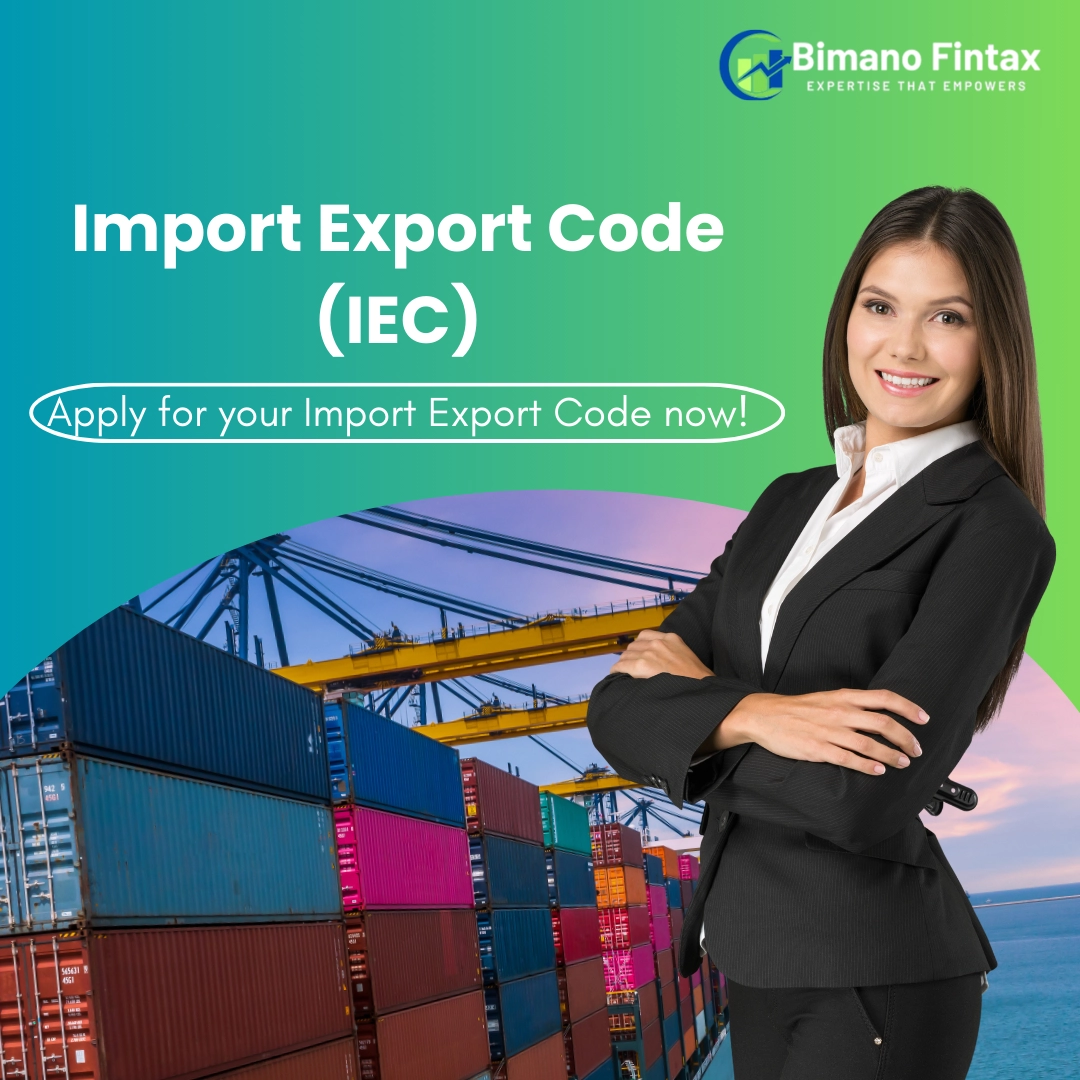Description
Introduction to the Import Export Code (IEC)
The Import Export Code (IEC) is a unique 10-digit code issued by the Directorate General of Foreign Trade (DGFT), under the Ministry of Commerce and Industry, Government of India. This code is mandatory for any business entity or individual engaged in the import or export of goods and services within the country. The IEC serves as a primary identification number for a business in international trade and is crucial for tracking and regulating foreign trade activities.
For businesses aspiring to venture into global markets, obtaining an IEC is a fundamental step. An IEC not only legitimizes the business operations on international platforms but also streamlines the procedural requirements involving customs, shipment clearances, and remittances. Without an IEC, businesses are barred from engaging in import and export activities, making it an indispensable tool for global business expansion.
The significance of the IEC extends beyond just compliance. It also opens up an array of opportunities for businesses, enabling them to explore international markets and expand their reach. With an IEC, businesses can avail benefits under various government schemes such as the Merchandise Exports from India Scheme (MEIS) and Services Exports from India Scheme (SEIS), which are designed to incentivize and boost export activities.
Additionally, the process of obtaining an IEC is streamlined and digitalized, making it easier for businesses to apply and receive their codes in a relatively short time frame. This has significantly reduced the administrative burden and expedited the process, encouraging more businesses to participate in global trade.
In conclusion, the Import Export Code is more than just a regulatory requirement. It is a gateway for businesses to enter the global market, ensuring compliance with international trade regulations while unlocking new growth avenues. For any business looking to expand its footprint internationally, securing an IEC is an essential and strategic move.
Importance of IEC for Importers
The Import Export Code (IEC) plays a pivotal role for importers, serving as a mandatory requirement for customs clearance. Without an IEC, importers cannot legally bring goods into the country, which underscores its indispensable nature in the realm of international trade. The code acts as a unique identifier for businesses, enabling them to interact seamlessly with customs authorities and ensuring that all imported goods are accounted for and compliant with national regulations.
Moreover, the IEC facilitates smooth financial transactions by allowing importers to make payments to foreign banks. This is crucial for maintaining the trust and continuity of international trade relationships. The code ensures that all monetary transactions pertaining to imports are transparent and traceable, thereby reducing the risk of financial discrepancies and fostering a safer trading environment. By having an IEC, importers can confidently engage in global commerce, knowing that their financial dealings are in strict adherence to both domestic and international laws.
Compliance with international trade regulations is another significant aspect where the IEC proves invaluable. It ensures that importers adhere to the legal frameworks governing global trade, thereby avoiding any potential legal complications that could arise from non-compliance. This compliance extends to various international trade agreements and protocols, further solidifying the importer’s position in the global market. The IEC acts as a bridge, connecting importers to the vast opportunities of international trade while ensuring that their operations remain within the bounds of legal and regulatory requirements.
In essence, the IEC is not merely a formality but a fundamental tool that empowers importers to navigate the complexities of global trade. It guarantees legal clearance, facilitates secure financial transactions, and ensures compliance with international trade regulations, thereby enabling importers to expand their businesses on a global scale with confidence and legal assurance.
Importance of IEC for Exporters
The Import Export Code (IEC) is a critical requirement for businesses aiming to export goods and services globally. For exporters, the IEC serves as a unique identification code that simplifies the shipment process, ensuring smoother and more efficient logistics. By possessing an IEC, exporters can streamline their operations, mitigating potential delays and complications at customs. This code acts as a key, opening doors to international markets and enabling businesses to send their products overseas with ease.
Another significant advantage of the IEC for exporters is in the realm of financial transactions. The code facilitates the seamless receipt of payments from overseas clients, enhancing the efficiency of cross-border financial exchanges. When an exporter has an IEC, it becomes easier to track and manage international payments, ensuring that funds are transferred securely and promptly. This aspect is particularly crucial for maintaining healthy cash flow and financial stability, which are essential for the sustainability and growth of an export business.
Furthermore, the IEC is indispensable for regulatory compliance. It acts as a safeguard, ensuring that exporters adhere to the laws and regulations governing international trade. Compliance with these regulations not only protects the business from legal repercussions but also bolsters its credibility and reputation in the global market. Exporters with an IEC are better positioned to navigate the complexities of international trade regulations, reducing the risk of non-compliance and the associated penalties.
Overall, the Import Export Code is a vital tool for exporters, facilitating smoother shipments, efficient financial transactions, and stringent regulatory compliance. By obtaining an IEC, exporters can enhance their operational efficiency, financial management, and legal standing, paving the way for successful global business expansion.
Benefits of Obtaining an IEC
Securing an Import Export Code (IEC) is a strategic move for businesses aiming to expand their horizons internationally. One of the prominent benefits of having an IEC is the ease it provides in executing international trade. With an IEC, businesses can seamlessly import and export goods, eliminating the bureaucratic hurdles that often impede cross-border transactions. This code serves as a unique identifier for a business, streamlining customs processes and ensuring compliance with global trade regulations.
Another significant advantage is eligibility for various government incentives and schemes. Many governmental bodies offer subsidies, tax benefits, and other forms of financial support to businesses engaged in international trade. Having an IEC allows businesses to tap into these opportunities, enhancing their profitability and competitive edge. For instance, schemes such as the Merchandise Export from India Scheme (MEIS) and the Service Exports from India Scheme (SEIS) are accessible to IEC holders, providing substantial rebates and incentives.
Increased market reach is another compelling benefit of obtaining an IEC. With the global marketplace at one’s fingertips, businesses can explore new markets, diversify their customer base, and reduce dependency on domestic markets. This expanded reach not only boosts sales but also mitigates risks associated with market fluctuations. By entering international markets, businesses can leverage global demand, thereby stabilizing their revenue streams.
Additionally, an IEC enhances a company’s credibility with foreign clients and suppliers. Possessing an IEC demonstrates a business’s commitment to complying with international trade norms, instilling confidence among potential partners. This credibility can lead to more favorable terms of trade, improved supplier relationships, and long-term contracts with international clients. It signifies a level of professionalism and reliability, which is crucial in building trust and establishing a strong presence in the global market.
Overall, the benefits of obtaining an IEC are manifold, encompassing operational efficiency, financial incentives, market expansion, and enhanced reputation. For businesses aspiring to grow beyond their national borders, securing an IEC is an indispensable step towards achieving sustained international success.
Step-by-Step Process to Obtain an IEC
Acquiring an Import Export Code (IEC) is a crucial step for businesses aiming to partake in international trade. The process, while straightforward, requires meticulous attention to detail. Below is a step-by-step guide to help you navigate through the application process for obtaining an IEC.
Step 1: Documentation Preparation
Before initiating the application process, gather all necessary documents. The essential documents include a copy of your PAN card, a passport-sized photograph of the applicant, a copy of the applicant’s Aadhar card or voter ID, and proof of the business address. For companies, additional documents such as the company’s incorporation certificate and articles of association are required. Ensure that all documents are up-to-date and correctly formatted to avoid any delays.
Step 2: Online Application Submission
The Directorate General of Foreign Trade (DGFT) has streamlined the IEC application process through its online portal. Visit the official DGFT website and navigate to the IEC section. Here, you’ll need to fill out the application form, known as the Aayaat Niryaat Form 2A (ANF2A). Pay close attention to each field, ensuring all information is accurate and matches the provided documentation.
Step 3: Payment of Fees
Once the application form is complete, proceed to the payment section. The current fee for obtaining an IEC is Rs. 500. Payment can be made online through various modes, including net banking and credit/debit cards. Keep a receipt of the payment as proof for future reference.
Step 4: Submission and Verification
After completing the payment, submit the application form and documents electronically. The DGFT will then review your application. This verification process typically takes 5-7 working days. If any discrepancies or issues arise, the DGFT will notify you to provide additional information or correct errors.
Common Challenges and Solutions
Applicants often face challenges such as mismatched documents or incomplete information. To overcome these hurdles, ensure all documents are clear and legible, double-check all entered information, and respond promptly to any DGFT queries. Utilizing professional services or consulting with experts can also help streamline the process and mitigate potential issues.
By following these steps and addressing common challenges proactively, businesses can obtain their IEC smoothly, paving the way for successful global operations.
How Bimano Fintax Can Assist You
Bimano Fintax stands as a pivotal partner for businesses aspiring to venture into the global market by obtaining their Import Export Code (IEC). With extensive expertise and a dedicated team of professionals, Bimano Fintax simplifies the otherwise complex process of acquiring an IEC, ensuring a seamless experience for their clients.
One of the key services offered by Bimano Fintax is comprehensive documentation assistance. The process of obtaining an IEC requires meticulous preparation and submission of various documents, which can often be overwhelming for businesses. Bimano Fintax’s expert team meticulously reviews and organizes all necessary documentation, ensuring that each requirement is met promptly and accurately.
Beyond documentation, Bimano Fintax also handles the critical step of application submission. Their team ensures that the IEC application is correctly filled out and submitted to the Directorate General of Foreign Trade (DGFT) without any delays. By managing this crucial step, Bimano Fintax helps businesses avoid common pitfalls and procedural errors that could otherwise hinder the approval process.
Furthermore, Bimano Fintax extends its support through diligent follow-up with the DGFT. Understanding that the approval process can sometimes encounter bureaucratic delays, Bimano Fintax’s team actively monitors the status of the application and communicates with the DGFT to expedite the approval process. This proactive approach not only saves valuable time but also offers peace of mind to businesses.
In essence, Bimano Fintax provides a streamlined and efficient process for obtaining an IEC, allowing businesses to focus on their core activities while venturing into international trade. Their comprehensive services—from documentation assistance to application submission and follow-up—ensure that businesses can navigate the complexities of obtaining an IEC with ease and confidence.
Success Stories and Client Testimonials
At Bimano Fintax, we pride ourselves on facilitating seamless experiences for businesses seeking to obtain their Import Export Code (IEC). Our clients’ success stories are a testament to the significant role the IEC plays in global business expansion. By sharing their experiences, we hope to illustrate the transformative impact of obtaining an IEC.
One such client, GreenLeaf Exports, a mid-sized agricultural products exporter, faced numerous challenges in their initial stages of international trade. With the assistance of Bimano Fintax, they successfully obtained their IEC, which opened the doors to new markets. The company reported a 40% increase in their export volumes within the first year of obtaining the IEC, attributing their growth to the streamlined processes and expert guidance provided by our team.
Similarly, TechWave Solutions, a technology firm specializing in software exports, experienced significant growth after securing their IEC through Bimano Fintax. The company expanded its client base to include major markets in Europe and Asia. The ease of compliance and the ability to navigate international trade regulations, thanks to their IEC, allowed TechWave Solutions to focus on innovation and service delivery. Their CEO remarked, “Bimano Fintax’s support was instrumental in our global expansion. The IEC not only simplified our export procedures but also enhanced our credibility with international clients.”
Another noteworthy success story is that of Artisan Crafts Co., a small business that specializes in handcrafted goods. Prior to obtaining their IEC, they struggled with reaching international customers. Post-IEC acquisition, facilitated by Bimano Fintax, they saw a surge in demand from overseas markets. They expanded their operations and now export to over ten countries. The owner shared, “The process of getting our IEC was smooth and efficient, thanks to Bimano Fintax. It has transformed our business, allowing us to achieve global recognition for our crafts.”
These testimonials underscore the profound positive impact that obtaining an IEC can have on businesses. Bimano Fintax remains committed to guiding companies through this essential process, ensuring they are well-positioned for global success.
Start Your Global Business Journey
Throughout this blog post, we have delved into the essential aspects of the Import Export Code (IEC) and its pivotal role in global business expansion. The IEC stands as a mandatory requirement for any entity engaged in the import or export of goods and services from India. It serves as a unique identifier, enabling businesses to seamlessly navigate international markets and comply with regulatory frameworks.
We discussed the step-by-step process of obtaining the IEC, highlighting the documentation required and the procedural nuances involved. Additionally, we explored the myriad benefits of holding an IEC, including enhanced market credibility, access to international financing, and the ability to scale operations across borders. For businesses aspiring to expand their global footprint, the IEC is not merely a regulatory formality but a strategic asset that unlocks numerous opportunities.
Moreover, the blog post underscored the pivotal role of professional assistance in streamlining the IEC registration process. Partnering with experienced consultants like Bimano Fintax can significantly simplify the journey, ensuring that businesses meet all compliance requirements efficiently and effectively. Bimano Fintax provides end-to-end support, from documentation to submission, ensuring a hassle-free experience for importers and exporters.
Obtaining an IEC is the first step towards global business success. It empowers businesses to explore new markets, forge international partnerships, and achieve sustainable growth. By securing your IEC with the help of Bimano Fintax, you can confidently embark on your global business journey, knowing that you have a reliable partner by your side. Take the leap, leverage the power of the IEC, and open doors to a world of opportunities.






Reviews
There are no reviews yet.